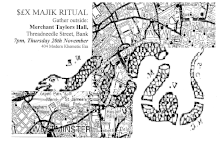Dérive
| Part of the Politics series on |
| The Situationist International |
|---|
 |

The dérive (French: [de.ʁiv], "drift") is an unplanned journey through a landscape, usually urban, in which participants stop focusing on their everyday relations to their social environment.[1] Developed by members of the Letterist International, it was first publicly theorized in Guy Debord's "Theory of the Dérive" (1956).[2][3] Debord defines the dérive as "a mode of experimental behaviour linked to the conditions of urban society: a technique of rapid passage through varied ambiances."[4]
Though solo dérives are possible, Debord indicates
that the most fruitful numerical arrangement consists of several small groups of two or three people who have reached the same level of awareness, since cross-checking these different groups' impressions makes it possible to arrive at more objective conclusions.[2]
The dérive's goals include studying the terrain of the city (psychogeography) and emotional disorientation, both of which lead to the potential creation of Situations.
History
[edit]The concept of the dérive has its origins in the Letterist International, an avant-garde and Marxist collective based in Paris. The dérive was a critical tool for understanding and developing the theory of psychogeography, defined as the "specific effects of the geographical environment (whether consciously organized or not) on the emotions and behavior of individuals."[4]
The dérive continued to be a critical concept in the theories of the Situationist International, a radical group of avant-garde artists and political theorists that was formed out of the Letterist International, CoBrA, and the International Movement for an Imaginist Bauhaus in the 1950s.[3] For the Situationists, the dérive was a revolutionary technique to combat the malaise and boredom of the society of the spectacle.[5]
Dérives are necessary, according to Situationist theory, because of the increasingly predictable and monotonous experience of everyday life in advanced capitalism.[2] Debord observes in his Introduction to a Critique of Urban Geography:
The sudden change of ambiance in a street within the space of a few meters; the evident division of a city into zones of distinct psychic atmospheres; the path of least resistance that is automatically followed in aimless strolls (and which has no relation to the physical contour of the terrain); the appealing or repelling character of certain places—these phenomena all seem to be neglected. In any case they are never envisaged as depending on causes that can be uncovered by careful analysis and turned to account.
— Guy Debord, Introduction to a Critique of Urban Geography[6]
In his manifesto for unitary urbanism, Raoul Vaneigem articulated some further ideas behind the dérive and the Situationist critique of space: "All space is occupied by the enemy. We are living under a permanent curfew. Not just the cops — the geometry".[7] Dérive, as a previously conceptualized tactic in the French military, was "a calculated action determined by the absence of a greater locus", and "a maneuver within the enemy's field of vision".[8] To the SI, whose interest was inhabiting space, the dérive brought appeal in this sense of taking the "fight" to the streets and truly indulging in a determined operation.
Praxis
[edit]Several groups have adopted the concept of the dérive and applied it in their own form, including many modern organizations, most notably the Loiterers Resistance Movement (Manchester), Wrights & Sites, the Unilalia Group, and the Providence Initiative for Psychogeographic Studies. Since 2003 in the United States, separate events known as the Providence Initiative for Psychogeographic Studies and Psy-Geo-Conflux have been dedicated to action-based participatory experiments similar to the dérive within the context of psychogeography.
Technology
[edit]A smartphone app named Dérive was developed in the 21st century by a team including Eduardo Cachucho and Babak Fakhamzadeh. The smartphone app shows a series of simple geography-based directions on a mobile device's screen such as "follow a red vehicle" to create the dérive experience.[9]
A similar application of the same name by Russian developer, Max Alyokhinc released in June 2017 does not require installation, instead working directly within a web browser. This application provides an additional mapping drift mode, where the application generates a point on the map to move to.[10]
In March 2020, an iOS and Android app called Randonautica launched and cited Guy Debord's essay on dérive as a core inspiration. It uses a random number generator to seed a random map location that the user is prompted to walk to while holding an intention in mind.[11]
See also
[edit]References
[edit]- ^ McDonough, Tom, ed. (2004). Guy Debord and the Situationist International: Texts and Documents. Boston: October Press.
- ^ a b c Debord, Guy (November 1956). "Theory of the Dérive". Les Lèvres Nues (9). Translated by Ken Knabb.
- ^ a b McKenzie Wark (2011). The Beach Beneath the Street: The Everyday Life and Glorious Times of the Situationist International (1st ed.). Verso. ISBN 978-1-84467-720-7.
- ^ a b Guy Debord (June 1958). "Definitions". Internationale Situationniste (1). Translated by Ken Knabb. Paris.
- ^ Guy Debord (1983). Society of the Spectacle. U.S.: Black & Red. ISBN 978-0-934868-07-5.
- ^ Guy Debord (September 1955). "Introduction to a Critique of Urban Geography". Les Lèvres Nues (6). Translated by Ken Knabb. Paris.
- ^ Gray, Christopher, ed. (1998). Leaving the 20th Century: the Incomplete Work of the Situationist International, London: Rebel Pub.. p. 26.
- ^ McDonough, Tom, ed. (2004). Guy Debord and the Situationist International: Texts and Documents. Boston: October Press. p. 259.
- ^ "What is Dérive app". deriveapp.com.
- ^ Веб-приложение для дрейфа.. Dérive. Retrieved 2020-06-12.
- ^ Wylde, Kaitlyn (29 June 2020). "Everything You Need To Know About Randonautica". Bustle. Retrieved 1 September 2022.
External links
[edit]Texts
- Introduction to a Critique of Urban Geography, Guy Debord, (1955)
- Theory of the Dérive, Guy Debord, (1956)
Films
- Psychohydrography, a dérive film (2010), by Peter Bo Rappmund
- Taxi, 2015, Iranian docufiction on Tehran by Jafar Panahi at The Guardian
- Drits (Derivas), 2016, a Portuguese docufiction on Lisbon by Ricardo Costa
